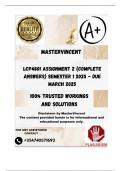,LCP4801 Assignment 2 (COMPLETE ANSWERS) Semester
1 2025 - DUE March 2025; 100% TRUSTED Complete,
trusted solutions and explanations.
Question 1 Name the theory/principle/doctrine/concept that is
being referred to in each of the statements below: 1) One of the
most time-honoured principles of international law is that which
enjoins States to implement their international obligations in
good faith. (1) 2) This is the vehicle through which customary
rules become part of the municipal legal system. (1) 3) In many
countries, and without more, treaties enjoy equal status with
municipal law. (1) 4) This doctrine does not apply in
international law, irrespective of the similarity between the
issues and dispute. (1) 5) “A collectivity of States established by
treaty, with a constitution and common organs, having a
personality distinct from that of its member-States, and being a
subject of international law with treaty-making capacity”. (1) [5]
1. Pacta sunt servanda – This is the principle that States
must perform their international obligations in good faith.
2. Monism – This theory holds that customary international
law automatically becomes part of domestic law.
3. Dualism – In dualist systems, treaties and municipal law
are regarded as separate legal orders, and treaties require
incorporation into domestic law to have legal effect.
4. Res judicata – This doctrine, under international law,
asserts that a decision made by an international court
cannot be re-litigated, even if similar issues or disputes
arise.
, 5. International Organization – An entity established by
treaty with a distinct personality under international law,
capable of engaging in international relations and treaty-
making.
Question 2 ‘There is no hierarchy among the sources of
customary international law listed in Article 38(1) of the ICJ
Statute. It is, in fact, nothing but an exercise in futility to attempt
to justify a ranking of some sort among these sources.’ To what
extent does this statement represent the true nature of the
provisions contained in Article 38(1) of the ICJ Statute? [10]
Introduction
Article 38(1) of the Statute of the International Court of Justice
(ICJ) outlines the primary sources of international law, which
are:
1. International conventions (treaties),
2. International custom,
3. General principles of law recognized by civilized
nations, and
4. Judicial decisions and the teachings of highly qualified
publicists as subsidiary means for determining the law.




